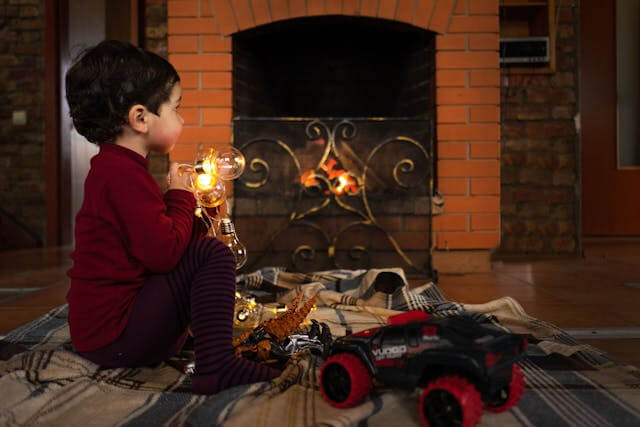The year is rushing to a close, and Christmas is almost in sight. Children worldwide are dreamy about the coming days and all they will become: firefighters, police officers, fairy doctors. It is also when houses get crowded and decked in holiday lights, full of laughter, happiness, and fire hazards.
Inspired by Fireman Sam, the brave firefighter who motivated generations of kids, here are essential safety rules for today’s children. Whether they face a risk at home or outdoors, they’ll be safe and ready for action!
#1 Fire Is Electric? Water Won’t Do the Trick
Spray water to extinguish a fire. It is among the oldest pieces of advice we picked up as kids. It’s so ingrained in our brains that any stray flame tempts us to throw water at it. However, kids should understand that water can be dangerous for electric fires.
The Electrical Safety Foundation reports an unsettling number of almost 51,000 electric fires annually. Besides claiming lives, they cause as much as $1.3 billion in damages to property.
If kids spray water on such fires, they face a risk of electrocution as water conducts electricity. It can be risky even if you have turned off the power outlet because the wiring will only get more damaged. Until you have help, sodium bicarbonate or trusty baking soda is your best bet.
Teaching Kids How to Prevent Electric Fires
As responsible members of the household, your children should keep an eye out for fire hazards. (Let’s not chuckle; kids usually understand much more than we imagine!)
Many electric fires arise from defective power plugs, overloaded outlets, and misfitting light bulbs that don’t match the recommended wattage. Kids can watch for flickering lights or odd sounds coming from appliances. They must inform you immediately if they detect anything amiss.
If children use an extension cord, it must be temporary and supervised closely. Tell them never to use it with ACs or space heaters.
#2 Leave Firefighting Foam Alone
Foam attracts children like fish to water. Its soft, velvety texture is beautiful to touch, which is why so many kids’ craft activities involve foam. Not too long ago, some public events let kids interact with foam that contained chemicals – constituents we now know are dangerous.
Firefighters sometimes use AFFF or aqueous film-forming foam to put out severe fires. However, it contains poly-fluoroalkyl substances that can trigger serious health concerns, including cancer, thyroid disease, and liver damage. Affected families of firefighters have even filed AFFF lawsuits to raise awareness and claim damages.
Unnerving Reddit threads discuss how station open houses and community events have previously been cavalier about using foam for “fun” activities. Although AFFF is not as omnipresent as before, we better keep our children on guard around forever chemicals. Get clarity on the type of foam used in events. You don’t want anything other than shaving foam or good old soap.
Even for professional firefighters, being cautious of the chemicals used in firefighting is imperative for staying safe. TruLaw notes that manufacturers may be accountable for exposing firefighters to harsh chemicals without adequate warnings.
As parents, we must be wary of all suspicious substances that touch our delicate little ones. No wonder thoroughly decontaminating your clothes and belongings is paramount after a fire.
#3 Smoke Detector: Get to Know It Better
We live around many risks: HVAC systems, careless cooks, temperamental toddlers. A working smoke detector is essential in a modern household. The American Red Cross advises putting up smoke alarms outside every sleeping area and testing them monthly.
Kids should not play with smoke detectors under any circumstances. Curious souls may get tempted to dismantle things, remove batteries, and check what happens. Parents must issue clear instructions on what kids must not touch.
Kids should understand what a beeping smoke detector signifies. The subsequent action is promptly informing the parents and leaving the house. A relevant concern is false alarms, which incorrect placement or malfunctioning detectors can cause. You don’t want a warning bell each time you fry bacon in the kitchen – even though the children may get a fit of giggles.
The most effective way to avoid false alarms is to ensure the appropriate device for your household and environment. Consult an expert to find the correct gadget and placement for you. For example, do you want a smoke alarm for a larger commercial establishment like a home-based cafe or a standalone unit for the living room?
#4 When in the Car, Keep Batteries Far
Sadly, cars catching fire is not a new phenomenon. Most of these fires stem from lithium batteries that have manufacturing defects. Lately, electric vehicles have faced the brunt of paranoia. However, the Guardian reports the contrary. The probability of an EV fire is lower than for diesel or petrol vehicles, or so the data suggests.
The real culprit here is the battery. In August 2024, North Carolina saw a fire inside a car in Burke County. It started with a children’s book that had a lithium-based button battery. These batteries are notorious for catching flames upon overheating.
Tell your kids not to leave battery-operated toys or books unattended in the car. Vehicles can overheat when parked in the sun for long durations.
So, did you get your kids to refresh their fire safety rules? You can even do a mock fire drill in the house to let everyone know the evacuation plan. As a parent, routine fireproofing is your department. It will entail everything from keeping away inflammable items like candles to turning off stoves and asking an electrician to check your power outlets.
Finally, there’s only one thing Fireman Sam would want you to say: All present and correct, sir!
